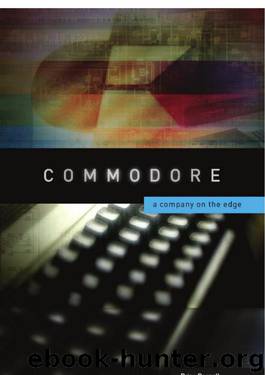Commodore by Bagnall Brian

Author:Bagnall, Brian [Bagnall, Brian]
Language: eng
Format: epub
Tags: EBC Converted
Published: 0101-01-01T00:00:00+00:00
* * *
Commodore Japan’s general manager was Taro Tokai, known
as Tony by westerners. Tokai was one of the most important
general managers because of his ability to negotiate with parts
suppliers in Asia, and he was skilled in setting up and
operating manufacturing plants. “He was also getting the stuff
out of Korea, and he was overseeing Korea and Taiwan until
they built up the Hong Kong operation,” says Russell.
Tokai gave Commodore access to the same chips Japanese
electronics companies relied on. “If you went over to Japan
you would find they had ten thousand chips that weren’t
available in the United States,” says Russell. “At that point in
time, the chip technology was already shifting to Japan. The
NECs of the world were catching up with what they were
doing in the US, especially peripheral chips and integrated
chips.”
When the RAM chip shortage hit the world in the early
eighties, Tokai continued supplying Commodore. “We were
really scrounging to buy RAM and stuff like that,” says
Russell. “He was a big supplier of parts for the computers.”
Tokai spoke formal English, and just as important, blended
into western business culture. Like the other general
managers, Tokai was always present at meetings in London
and trade shows such as CES.
473
Physically, Tokai was startlingly thin. When he traveled to
North America, his fellow managers were worried about his
health and encouraged him to eat more. He had a long face
with a pencil-thin moustache and spoke in a soft, deep voice.
“He was an extremely brilliant world class business leader
who understood the implications of the first home
computers,” says Tomczyk. “He supported and encouraged
his small team of engineers and software programmers to
work on this computer and make it happen.”
Tokai was the first Japanese businessman Russell met. “Not
knowing much about the Japanese, I was really impressed,”
says Russell. “Then I found out he was the wild maverick of
Japan. He had a huge reputation in Japan for being this bright,
non-traditional Japanese manager.”
Russell was in awe of Tokai’s ability to market American
electronics in Japan. “He was a sharp guy,” says Russell. “He
was marketing things like the VIC where he’s going up
against Japanese products in their own market, and he was
selling PETs. I mean, my God, how did he do it? All those
other guys had specialized keyboards with all different types
of shift keys to generate all the character sets.”
Russell soon learned that Tokai was an exception compared
to his Japanese contemporaries. “Most Japanese managers,
and even people below them, were company men,” says
Russell. “Tokai wasn’t like that at all—he was his own man.
He was going to be successful on his own. Commodore was a
great vehicle early on, but you could tell he was independent
of that.”
474
In many ways Tokai was the managerial equivalent of Yash
Terakura. “He was pretty much like me,” says Terakura.
“Very independent and he didn’t fit in with Japanese society
either. He was pretty much an oddball.”
Much of Tokai’s managerial style was absorbed from the
United States, allowing him to combine the best aspects from
Japan and America. “He was stationed in the US with the
Ricoh company and I think he kind of picked up the lifestyle
in the US,” says Terakura. “He liked it. It’s better than the
Japanese lifestyle.
Download
This site does not store any files on its server. We only index and link to content provided by other sites. Please contact the content providers to delete copyright contents if any and email us, we'll remove relevant links or contents immediately.
Pale Blue Dot by Carl Sagan(5007)
The Rules Do Not Apply by Ariel Levy(4965)
Goodbye Paradise(3809)
Ogilvy on Advertising by David Ogilvy(3621)
Liar's Poker by Michael Lewis(3446)
Delivering Happiness by Tony Hsieh(3422)
Into Thin Air by Jon Krakauer(3397)
Purple Cow by Seth Godin(3203)
Rogue Trader by Leeson Nick(3043)
The Social Psychology of Inequality by Unknown(3028)
The Airbnb Story by Leigh Gallagher(2854)
4 - Harry Potter and the Goblet of Fire by J.K. Rowling(2701)
The Mind Map Book by Tony Buzan(2575)
Bossypants by Tina Fey(2529)
Claridge's: The Cookbook by Nail Martyn & Erickson Meredith(2403)
All the President's Men by Carl Bernstein & Bob Woodward(2376)
Six Billion Shoppers by Porter Erisman(2302)
Master of the Game by Sidney Sheldon(2290)
Alibaba by Duncan Clark(2082)
